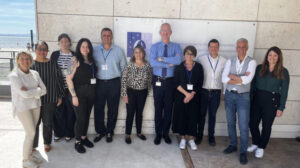“People are afraid of the Police. If you go to protests… you are marked and whenever they see you, they might stop you, control you.” This is just one of the obstacles restraining drug user activism in Macedonia. An article by Vlatko Dekov.
First of all, I am not sure if we can speak of drug users activism, such as I see it, because people have no awareness, no courage, there is no freedom of thought, and lately people have been afraid to talk openly on this subject because we live in such totalitarian times that communism from the past, for instance, seems like no big deal” – drug user, March 2014.
In Macedonia, there is no formal active grass roots organisation of people who use drugs. Historically speaking, the organisation HOPS was created at the initiative of people who use drugs and functioned as a genuine grass roots organisation, which in time expanded its professional structures. In the past 50 years there have been two initiatives for establishing two new grass roots organisations. The first one resulted with the Macedonian Association of Drug Users (MADU), established in 2013, and the second initiative in 2006 with the organisation Pasaž. The two instances were instigated by Healthy Options Project Skopje – HOPS. Even though MADU was never set in motion, Pasaž was formally registered and active for a certain period. One of Pasaž’s more significant activities was the publication of a fanzine on various topics related to the interests of people who use drugs. However, although the organisation still exists formally and legally, it hasn’t being active for some time now.
The lack of an active grass roots organisation naturally limits people who use drugs in Macedonia in their motivation to engage in activism. However, even if such organisations existed, in this case an organisation of people who use drugs, the representation of their interests and rights would still be lacking. Namely, without political awareness for activism, and dedication on the part of its members, the struggle for their rights remains futile.
The fact that none of the users in Macedonia responded to HOPS’s open call for submitting articles on the subject of drug user activism to the magazine speaks volumes.
Still, what caused this situation? It is a question that intrigued us in 2014, when, together with my colleagues and friends Irena Cvetkovic and Vanja Dimitrievski, we undertook research to find the key problems that prevented people who use drugs from organising, speaking publicly, and representing themselves. Is it due to the social stigma towards them, or something completely different?
Reasons that restrain drug users’ activism
The social contexts we live in and its tight grip on us.
“First of all, I am not sure if we can speak of drug users activism, such as I see it, because people have no awareness, no courage, there is no freedom of thought, and lately people have been afraid to talk openly on this subject because we live in such totalitarian times that communism from the past, for instance, seems like no big deal” – drug user, March 2014.
Our social context prevents, or to be more precise limits, the possibilities for activism in general, particularly activism of marginalised communities. The prevailing political parties largely polarised Macedonian society into fractions according to ideological and national affiliation. In their struggle for power they destroyed virtually every model of civil activism. Macedonia is a rare, even a unique case in the world, where civil protests are received with counter-protests.
Furthermore, a number of civil initiatives remained without any response – the cases of Police Brutality, the Civil Initiative “Aman”, MOF’s Initiative (Youth Educational Forum) on the External Student Testing, etc. The final effect of these and many other civil initiatives is the indifferent citizen. However, this year we witnessed several mass protests that lasted for several months (the Coloured Revolution, the Student Protests), which give hope that finally activism and public representation for one’s owns rights will flourish and become customary in Macedonia.
Our system relativises political activism in several ways. Media destroyed the culture of debates and critical thinking by broadcasting cheap commercial programs (Turkish or Indian soap operas, reality shows, etc.) grounded on generally accepted sentiments and “safe territories,” a far cry from public activism – a sphere of permanent antagonism and leaving one’s comfort zone. Though people who use drugs are oppressed in Macedonian society, they still lack political awareness regarding activism.
People who use drugs in Macedonia mirror the society we live in. They are very much alike their fellow citizens when it comes to political awareness. In other words, awareness of how to represent the interests of the drug user community for the achievement of common goals is lacking. Namely, as with most Macedonians, most of the people who use/have used drugs, chiefly tend to benefit personally from their circumstances. Instances where certain people who use/have used drugs publicly advocated for the community’s interests are seldom, as for example advocating for better behaviour towards people who use drugs, reforms in drug laws, etc. People on methadone or buprenorphine replacement therapy advocate for the community’s rights only to the point where they can still personally maintain comfortable positions in the Addiction Program. This comfort mostly implies weekly, instead of daily administration of pharmacotherapy, avoiding triage visits to review the pharmacotherapy doses, the excess of which is sold for personal financial profit, and in the worst case losing the status of the doctor’s favourite.
The lack of political awareness results from not knowing one’s rights, in this case the right to treatment, the main reason users choose to be passive. People from the community confirm this. “Well, we don’t know our own rights. I, for example, don’t know what my rights are regarding treatment.”
Public ideological-moral perception of drug use
Drug use in Macedonia is considered immoral, while people who use drugs are seen as “lunatics,” “the outcasts of society,” “criminals” and other distasteful epithets. People who use drugs are aware of how society perceives them. “We are seen as the lower class because, you know, a “junkie”, he has to steal 500 denars [8.5 USD] from somewhere or lie to someone… The public opinion of people who use drugs is very low.”
The undesirability of people who use drugs as Macedonian citizens was confirmed with the 2010 research of the Macedonian Centre for International Cooperation. According to the findings, as many as 96.8% of Macedonian citizens wouldn’t wish to have drug addicts as neighbours, significantly larger compared to the other communities: alcoholics – 93.6%, criminal offenders – 84.1%, people with AIDS – 82.9%, homosexuals – 77.9%, etc.
People who have used drugs in the past and are on addiction treatment are partially excluded from this perception. Society tends to embrace them with suspicion due to the prevailing opinion “once a junkie, always a junkie.” Consequently, people undergoing drug addiction treatment cannot be separated from the people who actively use drugs.
Stigma and discrimination
The stigma towards people who use drugs is definitely the biggest obstacle preventing this community from developing activism, as confirmed by our respondents. The stigma stems from several sources. Firstly, “Our society fails to recognise mistakes such as endangering one’s health in order to experience pleasure, or a conscious decision to use drugs in order to experience pleasure that later might cause addiction. In this case, the stigma doesn’t result from the illness, although it might. Rather, from the decision to use drugs that leads to addiction.” This clarifies the phrase we often hear – “it’s their own fault,” a justification for the stigma, even the hatred towards people who use drugs because they are, of course, unsuccessful and immoral people who destroy themselves and their family for their own pleasure.
According to some theoreticians, Macedonian society nurtures masculine norms that encourage “a man’s behaviour.” Such norms demand that the individual faces all problems and challenges in life “successfully” and as a “real man.” Those who do not fit the norm become marginalised and stigmatised, as is the case with people who use drugs. “The person is not able to independently make decisions. Many social factors are in question, as well as the context they live and act in.”
Stigma and discrimination forces people who use drugs to seek refuge at the margins of society and avoid speaking publicly, particularly on topics that might reveal their drug use. The fear of being publicly recognised impedes or restrains activism, particularly since public recognition with such social values equals losing one’s fundamental human rights. For instance, public recognition of drug use endangers employment, or maintaining a job position. “Who?… Who will tolerate you being late every other day at work [because of the administration of methadone therapy]? Job positions, directors that…, bosses that understand you are on methadone therapy and still let you work are rare. Very rare! There is discrimination in employment. If they found out you are on methadone therapy, they fire you.”
Fear of the police
Advocating for an issue demands public speaking. People who use drugs rarely go out in public, listing fear from the police as an additional cause of stigma. They fear being followed and additional problems if the police reveal their status. “People are afraid; of the Police and the system and its institutions… You might be marked for life. If you go to protests… you are marked and whenever they see you, they might stop you, control you, search you… humiliate you in public… It is a police state.”
Self-condemnation
Although not detected in every respondent, self-condemnation is another factor preventing personal engagement and activism. Namely, some respondents stated that they condemn themselves for the discomfort and numerous problems drug use has caused to the family, which makes them more introverted and unmotivated to engage in activism. We did not study the level of self-condemnation, however its presence was different among the respondents. In addition, some people who use drugs are embarrassed of their drug use mostly because of the shame they inflict on their families and the attitude of the broader community.
“I wouldn’t like to speak publicly because… first of all the shame… how can I say… nowadays… for instance I live in Centre… and people in my neighbourhood think it is embarrassing to do drugs in the 21st century. How can I explain… That’s what they say.”
The question remains of whether, if the drug use was viewed from a different ideological perspective and social context, self-condemnation would have been smaller and would have led to better circumstances regarding activism and advocating for their own rights.
Legislative Regulations
A small number of respondents expressed awareness, saying that the current legislative regulations prevent more intensive activism by people who use drugs. However, once the interviewer explained how legislation can lead to greater freedom, hence activism, most respondents agreed that if there was different legislation regulating drugs – i.e. if possession for personal use was not penalised – it might help them with their fear of the police, and increase the chances to engage in activism.
“Absolutely! It will absolutely help them be more visible and encourage them, simply give them courage to publicly speak about the problem.” (AU_MZZ2014_I_VB)
Future Perspectives
To conclude, the public ideological-moral perception of drugs and drug use is interconnected with the political and institutional context which highly restrains the political self-awareness of people treated for drug addiction, and people who use/have used drugs as a whole. Exposure to constant stigmatisation, discrimination, and police persecution due to their drug use causes embarrassment in people who use/have used drugs, forcing them to accept the marginalised status imposed by society and legislation. Lacking supporting environment, these people avoid speaking publicly and as a result suffer more discrimination.
It is high time the situation changed so that people who use drugs in Macedonia can apply this awakening moment towards engaging in activism. They have to finally come out of the closet and publicly say “Nothing about us without us.” If not now, when?
Vlatko Dekov






